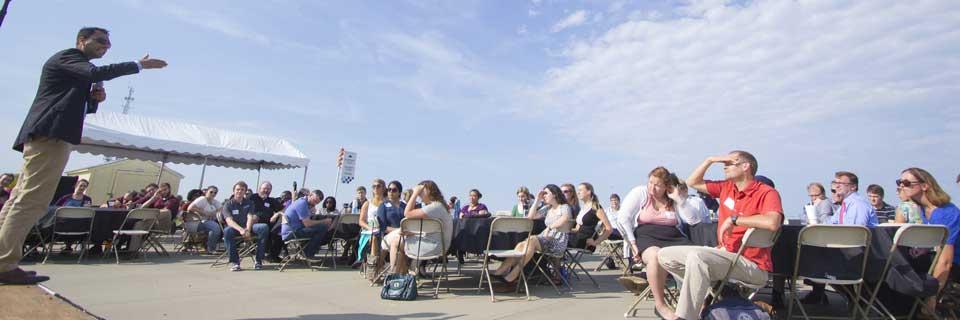Conference Celebrates 50 Years of "Nostra Aetate"

Starting and maintaining meaningful interfaith dialogues on college campuses is about more than simply recognizing the different faith traditions present. According to Eboo Patel, it’s about “finding the resonances.”
Patel was the featured speaker and leader for the “Advancing Interfaith Cooperation” conference Sept. 3 as students, faculty and staff from Catholic colleges and universities across the Kansas City area gathered at the Kansas Speedway to celebrate the 50th anniversary of “Nostra Aetate,” a 1965 declaration from Pope Paul VI that grew out of the Catholic Church’s Second Vatican Council and signaled a shift in direction for the church when it came to relations with people of other faith traditions.
Patel, who founded the organization Interfaith Youth Conference, was a member of President Barack Obama’s inaugural Advisory Council on Faith-Based Neighborhood Partnerships and speaks nationally about the importance of fostering interfaith relationships based on mutual respect, draws from his own experience in his work. His father, a Muslim immigrant from India, attended the University of Notre Dame and gave his son a perspective on how much religions share and how people of different religious traditions should “find the resonances” instead of focusing on where they differ.
“It’s a deep commitment to one’s own tradition and because of that commitment, because one has seen the sun, if you will, in that tradition, one can begin to discern the rays of light that are truth and goodness and holiness in other traditions,” Patel said.
The lesson was reinforced by his experience with Bro. Wayne Teasdale, a Catholic monk who was a pioneer in the realm of interfaith thinking and with whom he took part in a series of meditative centering prayers in urban Chicago, looking for the evidence of spirituality in all things.
Bro. Teasdale, who professed vows in the Catholic tradition and in the Hindi tradition, told Patel the publication of “Nostra Aetate” was an important event in the formation of his faith. Surrounded by students from the Jewish, Islamic and Sikh faiths as well as the Catholic tradition, Patel said 50 years later the document still has a lot to offer, despite being only two and a half pages long.
In breakout sessions hosted by leaders from IFYC, the promise of “Nostra Aetate” was put into practice as students shared how their personal experiences and their faith shaped them and were encouraged to discuss their traditions in an honest, understanding way. James Pulliam, a sophomore from the University of Saint Mary, said the sessions helped the conversation of interfaith partnership begin in an organic way.
“That helps me understand myself, who I am as a person, what I believe in, but it also helps me understand others,” he said. “Before we talk about our faith with other people, we have to know who we are as people.”
Patel said he never intended the end of the workshop to be the end of the conversation. IFYC offers a range of resources for schools that wish to create and sustain their own interfaith initiatives, which can take the form of academic programs, student groups, or co-curricular activities. Rockhurst University President the Rev. Thomas B. Curran, S.J., said in an introduction to the day’s activities that fulfilling the promise of “Nostra Aetate” meant becoming everyday ambassadors for its message of acceptance.
“There is an expectation you’re going to go back with this information and fortify and share with that so that we can celebrate what we are about in our time,” he said.
Rachel Franklin, a Rockhurst University senior raised in a Reform Jewish congregation, said she wants to see that celebration and productive discussion extend past the boundaries of campus, as well.
“I hope that people will go back and instead of saying ‘what can I do on campus to create that interfaith dialogue?’ they can start integrating it into their everyday lives and talk to friends and family,” she said. “It’s such an important part of being alive and understanding other people’s perspective, but they’re conversations that we’re kind of scared to have sometimes.”







